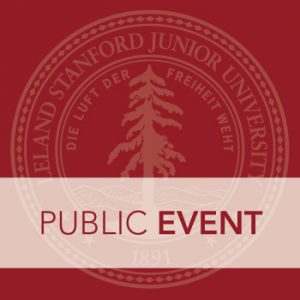event
The Innovation Learning Curve

October 27th, 2014 - 5:30 pm to 7:00 pm
Paul Brest Hall, Stanford Law School
Johanna Mair and Christian Seelos, with Kevin Starr and Jim Fruchterman
Are funders and social sector organizations overrating the value of innovation social change projects? Can social sector organizations make innovation more productive? How is innovation linked to the long-term value creation logic of an organization?
At the Stanford Center on Philanthropy and Civil Society, Christian Seelos and Johanna Mair engage in research on productive innovation in social sector organizations.
The duo are known for challenging status quo assumptions about innovation. During this evening conversation, they will share insights on how to diagnose and overcome innovation pathologies – organizational and external factors that make innovation unproductive. Based on their research that builds on unique decade-long relationships with leading social sector organization such as Aravind Eye Care Hospital, BRAC, Gram Vikas, and Waste Concern, the researchers will propose an “innovation learning curve” – the ability to create more value more productively from new ideas. They will introduce various innovation archetypes to illustrate how organizations effectively balance innovation and scaling over time and how this delicate balance defines their organizational trajectories.
Bios
Johanna Mair is Professor of Management, Organization and Leadership at the Hertie School of Governance and the Hewlett Foundation Visiting Scholar at the Stanford Center on Philanthropy and Civil Society and the Academic Editor of the Stanford Social Innovation Review. From 2001 to 2011 she served on the Strategic Management faculty at IESE Business School. She has held a visiting position at the Harvard Business School and teaches regularly at the Harvard Kennedy School and INSEAD. Before earning her PhD in Management from INSEAD (France), she was directly involved in executive decision-making in international banking. In 2008 she was recognized as a “Faculty Pioneer” for Social Entrepreneurship Education by the Aspen Institute. Her research focuses on how novel organizational and institutional arrangements generate economic and social development and the role of innovation in this process. She is the co-editor of three books and has published in leading academic journal. Today, alongside her academic responsibilities, she serves on the Global Agenda Council on Social Innovation of the World Economic Forum and carries out advisory and board work for multinational companies, the United Nations, governments, foundations and social venture funds.
Christian Seelos is a visiting scholar at the Stanford Center on Philanthropy and Civil Society, where he co-leads the OCCI research project. He is the Leo Tindemans Chair on Business Model Innovation and faculty at the Department of Economics and Business at KU Leuven (Belgium) and an academic visitor at Oxford University (UK). Most recently he served as the Director of the IESE Platform for Strategy and Sustainability and a Senior Lecturer in the Strategic Management Department at IESE Business School. He teaches MBA and executive courses in International Business, Global Strategic Management, Social Entrepreneurship and Strategy and Sustainability. Christian researches the interface between organizational strategy and global sustainability including social innovation, new business models for poverty alleviation, climate change and water stress. The Strategic Management Society recognized his recent research on innovative corporate strategies in emerging markets with the Best Paper Award for Practice Implications and also was awarded the Gold Price of the highly contested IFC-FT essay competition on private sector development. He has published widely in peer-reviewed journals in the natural- and social sciences, held managerial positions in the private industry and served as Senior Adviser to the Chairman at the United Nations Special Commission on Iraq (UNSCOM) where he led inspection and disarmament efforts on biological weapons in Iraq.
Jim Fruchterman is a leading social entrepreneur and CEO of Benetech, a nonprofit technology company based in Palo Alto, California. He is a former rocket scientist who creates technology social enterprises that target underserved communities. In 1989, Fruchterman founded Arkenstone, a nonprofit social enterprise, to produce reading machines for people who are blind. In 2000, the nonprofit changed its name to Benetech and began creating new technology for people with disabilities, the human rights and environmental conservation communities. Fruchterman has received a MacArthur Fellowship and the Skoll Award for Social Entrepreneurship. He believes that technology is the ultimate leveler, allowing disadvantaged people to achieve more equality in society.Kevin Starr
Kevin Starr directs the Mulago Foundation and the Rainer Arnhold Fellows Program, both of which are focused on scalable solutions to meet the basic needs of the very poor. Kevin had a perfectly good career in medicine when he stumbled into philanthropy in 1994. His friend and mentor Rainer Arnhold died suddenly when they were working together in Bolivia, and the Arnhold family asked Kevin to help carry on Rainer’s work through the Mulago Foundation. He spent the next decade working with projects from Afghanistan to Zambia, trying to figure out what makes for real impact at big scale.
Kevin established the Foundation’s Rainer Arnhold Fellows Program in 2003 to apply Mulago’s principles and tools to help social entrepreneurs turn good ideas into lasting change at scale. The program gives fellows a chance to design for impact that can go big. Kevin teaches and mentors fellows in numerous other programs for social entrepreneurs and serves as the chairman of Big Bang Philanthropy, a group of funders working together to direct more money to those best at fighting poverty.
Kevin went through medical school and residency at UC San Francisco and has lived in SF ever since.

